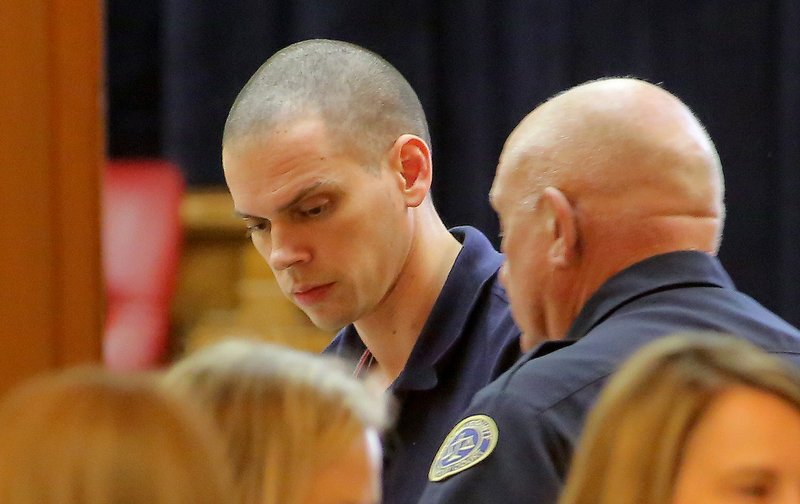Two Pulaski County sheriff's deputies denied Tuesday that they twisted Arron Lewis' arm out of its socket while questioning him in the disappearance of real estate agent Beverly Carter and, after doctors fixed it, yanked it back out of place on purpose, leaving Lewis in intense pain.
Lewis, 35, is pursuing excessive-force claims against Gary Seibel, a reserve deputy who walked him down a hallway to a bathroom in the sheriff's office during his interrogation on Sept. 29, 2014, and Lt. Jackson Bennett, who is accused of roughly removing an arm-stabilizing sling after doctors fixed the dislocated shoulder two days later.
U.S. District Judge Billy Roy Wilson is hearing a nonjury trial on Lewis' excessive-force complaints against the two deputies, in their individual capacities only, after dismissing several other claims Lewis alleged in a 2014 lawsuit that also named Sheriff Doc Holladay, several other deputies and medical staff members at the county jail.
Lewis filed the suit shortly after his arrest in the kidnapping and slaying of the 50-year-old real estate agent, for which he was convicted and sentenced Jan. 15 to two life terms in the Arkansas Department of Correction. On Aug. 21, Wilson adopted the recommendations of U.S. Magistrate Judge Jerry Cavaneau in dismissing the other defendants and claims while leaving the factual disputes to be decided at trial.
The trial began Tuesday in Wilson's Little Rock courtroom and is expected to conclude today. Lewis is seeking monetary damages.
Holladay testified that there was never a time when Seibel was alone with Lewis except possibly when Seibel briefly went into a bathroom stall with Lewis while a sheriff's major remained within "arm's reach" of both.
"Typically," he said, "at least two deputies escort an arrestee or inmate" to the bathroom.
David Fuqua, an attorney for the county, suggested that Lewis dislocated his shoulder before he got to the sheriff's office, when he jumped off a second-story roof just before Little Rock police arrested him outside a west Little Rock apartment complex. Lewis has acknowledged that his knees and ankles were injured as a result of the jump, and that his back hurt and glass was embedded in his scalp as the result of a car crash the previous morning, when he realized he was under surveillance and sped away from deputies.
Detective Jeff Allison testified that when Lewis was initially arrested on a kidnapping charge, the deputies' priority was finding Carter in the hope that she was still alive and could be rescued. Allison said Lewis "alluded that she could be alive. He asked me how long a person could survive without food or water." Allison acknowledged that deputies were frustrated with Lewis for dragging his feet, even taking deputies on a wild goose chase to Lonoke, where he said Carter was being held, only to find no one there.
Allison noted that during the ride after Lewis' interrogation at the sheriff's office, he allowed Lewis to smoke a cigarette in the back seat of a patrol car, where he sat with his feet shackled, and his hands cuffed to a "belly chain." He noted that Lewis didn't seem to have trouble maneuvering his arm to flick ashes off his cigarette out the car window, despite the chains.
Bennett testified that he took Lewis to the UAMS Medical Center emergency room Oct. 1, after he kept complaining of shoulder pain, and waited while doctors wrenched his shoulder back into its socket after three tries. Bennett denied hearing the doctor say, upon releasing Lewis, that he needed to keep the immobilizer on his arm for at least three weeks. However, Bennett said he told the doctor that Lewis wouldn't be able to keep the device on in the jail because he'd been placed on suicide watch and the sling could be used as a choking device. He said the doctor insisted on securing the sling anyway, saying "it needed to be on for him to be discharged."
Bennett said he didn't relay any instructions from the doctor to the jail's medical staff when he returned Lewis to the jail, because "inmates are the sole responsibility of qualified medical staff," and that he removed the sling to comply with the suicide-watch directive, but didn't remove it violently.
Holladay testified that Bennett was following county policy by refusing to let Lewis wear the sling while on suicide watch.
"It was my decision to put him on suicide watch until he could be seen by one of our two psychiatrists or our medical staff," Holladay told Lewis' attorney, Chet Dunlap of Trumann. He added, "I didn't want anything to happen to him or anyone else."
The sheriff spoke forcefully when he said, "We're not the judge, jury and executioner in my office. We house, we feed, we clothe, we medicate -- and we get them to court on time."
Holladay said that not all capital-murder suspects are placed on suicide watch, but he felt it was necessary in Lewis' case, and that he didn't do it to punish Lewis.
The sheriff read aloud a jail psychiatrist's report after an Oct. 3, 2014, evaluation. The doctor wrote that a "truly accurate assessment" of Lewis' mental stability was impossible, so the suicide watch should remain in place.
Kimberly Stowe, a licensed practical nurse at the jail, testified that she did an intake evaluation on Lewis early Sept. 30, 2014, after his initial interrogation, and noted a "dislocated right shoulder." But she said she wrote that only because "this is what he told me."
Stowe said she pulled aside Lewis' shirt and looked at the shoulder herself, but could see no evidence of dislocation. She said she couldn't give him an ice pack for the vehicle-accident injuries he complained of because inmates on suicide watch aren't allowed to have the rubber gloves that accompany ice packs.
Sarah Speer, a retired registered nurse at the jail, confirmed that she wrote in a progress note on the morning of Oct. 3, "Some deformity noted. No range of motion," indicating that Lewis had a dislocated shoulder then. Asked by Dunlap if it looked like the shoulder had been dislocated a second time, she said, "I can't say that."
Speer also testified that she couldn't recall Lewis speaking to her about being abused by anyone at the sheriff's office or the jail.
Metro on 04/20/2016


